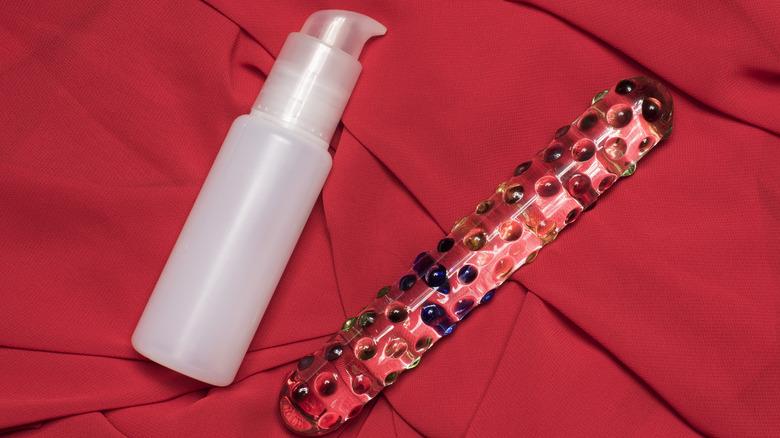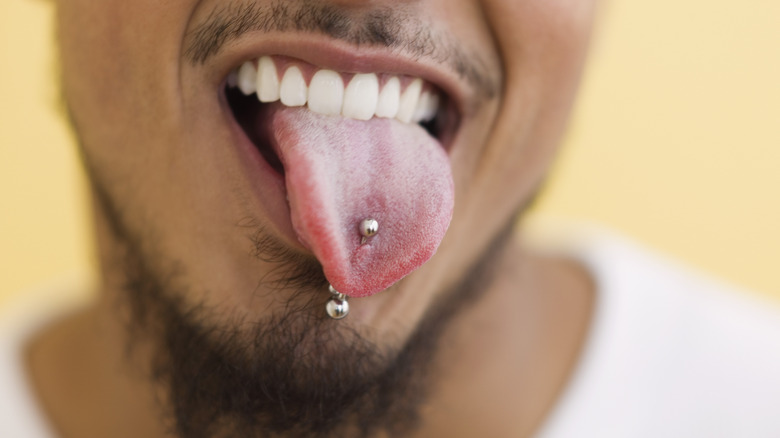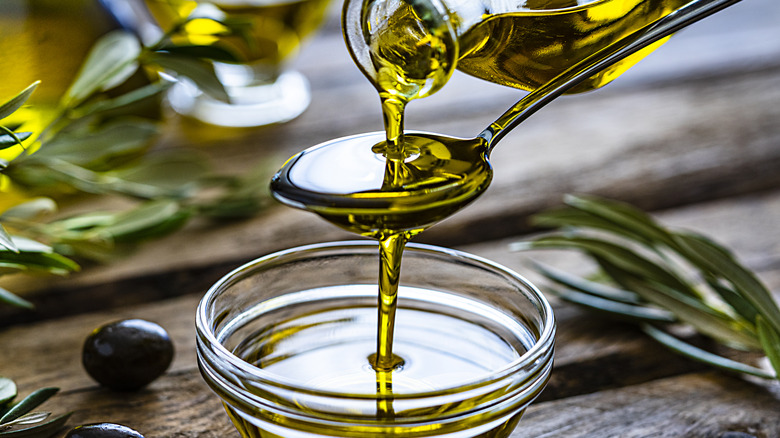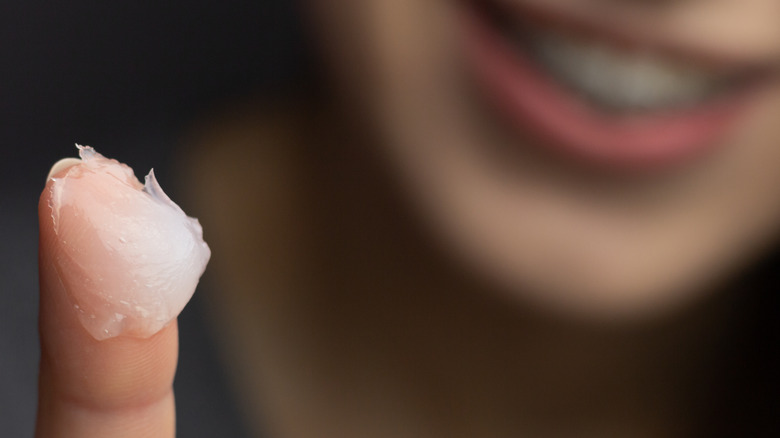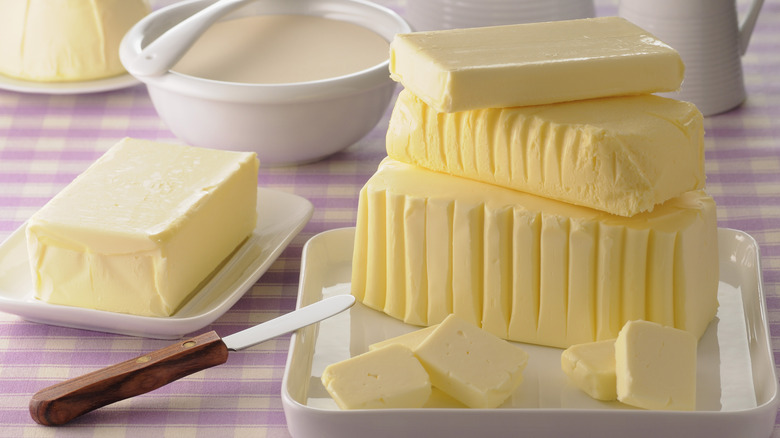The Lube Alternatives You May Want To Stay Away From (They'll Do More Harm Than Good)
If you've been sexually active long enough, then you've probably heard the mantra "wetter is better" and it's true. Lube makes vaginal, oral, and anal penetration so much more enjoyable. It's also great for masturbation, foreplay, and other sexual situations that may call for some extra lubrication. If you've yet to explore the positive enhancement that lube can bring to your sex life, then put that at the top of your to-do list right now. You won't be disappointed.
But while there are dozens of brands of lube on the market to choose from, and even more types of lube to fit into your sex life, some people opt for what they have lying around the house. That can be a problem. Store-bought personal lubricant is made to lubricate the vagina, whereas that tub of Cetaphil or Vaseline in the bathroom, is not.
Although finding the right lube for you and your sex life will be a trial-and-error process, the most important thing to keep in mind is that, when it comes to using lube during sex, you want actual lube. Anything else — even that which might seem completely innocent — may end up causing far more harm than good.
Spit
Ah, spit. The lubricant alternative as old as time. It might be safe to say that many, far too many, have turned to spit when actual lube wasn't an option and thought it was okay. But — it's far from okay. It's actually a really bad alternative in more than a few ways.
Not only is spit lacking in the ability to properly lubricate, possibly leading to tiny tears in the vagina, sphincter, or anus, but it's loaded with bacteria. According to a 2019 study published in the Journal of Oral and Maxillofacial Pathology, the oral cavity is home to over 700 species of bacteria. While this oral microbiome, as they call it, works well with all these bacteria doing their thing, it doesn't mean it's a fit for other parts of the body.
For example, the bacteria in the mouth and the bacteria in the vagina are very different — as they should be, considering the role each part of the body plays. So when you introduce spit bacteria to vaginal bacteria, you can throw your vaginal flora for a loop, resulting in possible yeast infections or bacterial vaginosis. You even run the risk of getting a yeast infection every time you receive oral sex; that's how opposite those bacteria are.
Spit can also carry with it STIs. Research has found that saliva can carry gonorrhea, as well as herpes, syphilis, and HPV. So while you may think your spit is harmless, it's not.
Olive oil
While olive oil was the lube of choice for the ancient Greeks and Romans, that was simply because they didn't have many other options. But you do, so keep the olive oil in the kitchen where it belongs.
One of the biggest issues with olive oil is its effect on condoms. Olive oil damages the integrity of the latex, increasing the risk of the condom tearing or breaking. Naturally, when this happens, STIs can be transmitted and, if condoms are your preferred method of birth control, you may need to make a run to the pharmacy for emergency contraception.
Olive oil can also clog your pores, and if there's any place in the body where you don't want clogged pores, it's in and around your genitals. Clogged pores can become irritated during intercourse or other sexual acts, resulting in an infection due to the bacteria that made its way into the aggravated area. Also, open sores due to breakouts from clogged pores can make STI transmission even easier. In addition to dealing with possible broken condoms and acne in your genital area, olive oil is relentless on fabric. Try as you might, getting olive oil out of your sheets and clothing is on par with tilting against windmills — nothing is going to come of it.
Vaseline
Vaseline is a great moisturizer. Chapped lips in the winter? Just tap on some Vaseline. But all petroleum jellies share something in common: they're oil-based. So, just like using olive oil, coconut oil, baby oil, or any other oil-related substance, you increase the risk of condom breakage.
Not only are your condoms and dental dams in danger when you opt for Vaseline, but this product was made to moisturize external parts only. It even says on the packaging that it's not to be used internally. A 2013 study published in Ovid found that those who used petroleum jelly as lube had an increased risk of bacterial vaginosis. Although the study didn't say why this was the case, the fact that Vaseline and similar products remove water from the surfaces they touch could suggest that when petroleum jelly gets into the vagina, it can cause drying, thereby making it more susceptible to infections. Also, Vaseline causes stains that are near impossible to remove.
Butter
Even if you've never seen the movie "The Last Tango in Paris," you've probably heard of the infamous sexual assault scene, in which Marlon Brando reaches for butter to use as lube. It's a violent, degrading, and triggering scene that doesn't deserve to be linked to, but that one scene unfortunately contributed to putting butter on the map as a lube alternative.
The first thing we need to remember about butter is that it's a dairy product, meaning it contains animal proteins that can spoil pretty darn fast. If you've ever smelled sour milk, then you know what it smells like; That alone should deter you from putting butter anywhere near your genitals. Butter also has a higher pH balance than the vagina, making it open season for disrupting the vaginal flora, leading to a surefire infection.
Butter is comprised of not just animal proteins but oil too, which can break down any latex method of birth control or STI prevention you might be using. Also — and this one may change how you look at butter forever — but if you take a stick of butter into the bedroom, use it, maybe reapply it, and then put it back in the fridge — well, just think about that one long and hard. Although one would hope that such a thing would be immediately thrown out, sometimes things end up where they shouldn't. You know, like butter in your vagina.
Water
If you're a fan of "Vanderpump Rules," then you may have come across the "Secrets Revealed" episode where Lala Kent stands by her preferred method of lube: water. While no one should be taking any sort of sex, love, relationship, or even life advice from this show, the major thing to assert here is that water should never, ever be used as lube.
Although in theory something wet, like water, seems like it would be right at home in a wet vagina, it is not. We're talking about two different types of wetness here. Water is water and vaginal wetness is what's known as arousal fluid, that's released inside the vagina as natural lubrication to make penetration more enjoyable with limited friction and, ideally, no pain.
When Stassi found out what Lala uses for lube, she responded, "I think water dries it out ... " which is absolutely correct. (But still don't look to these people for sex advice!) While water may not deteriorate latex or cause bacterial infections on its own, the impact it has on the vagina could lead to excessive friction (think broken condoms), which could then lead to tears in the vaginal vestibule and/or vaginal walls (hello, infection). So, you're really no better off than if you used olive oil or Vaseline.
Also, water washes away natural vaginal lubrication, which is why sex in the water is never as hot and pleasurable as it appears in movies. Water-based lube, on the other hand, can make sex in and out of the water feel good. That's why it's best to always stick to actual lubes: water-based, silicone-based, or oil-based.
